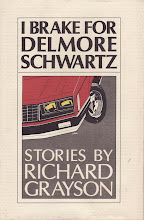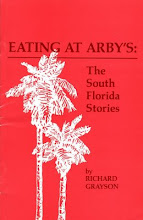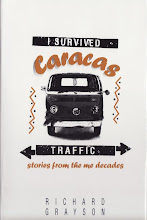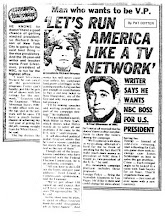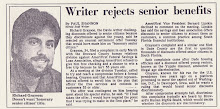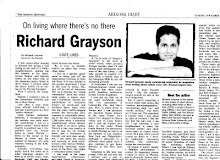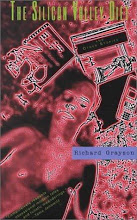
For the second Friday evening in a row, we headed for everybody's favorite Arizona bookstore,
Changing Hands, to see a fascinating film,
Paperback Dreams, and a discussion afterwards on the future of indie bookstores and Changing Hands' important role in the culture of metro Phoenix. It was another of the many wonderful events at this Tempe mainstay. (And given the subject of
the one-hour documentary, the struggles of two venerable Bay Area bookstores, we stress the "stay" in "mainstay.")

We hurried over as best we could from Apache Junction after dinner, but getting to Tempe's McClintock Drive store just five minutes before the 6 p.m. starting time for the film, we saw that the room was full. But then we were told they'd be moving the screening out on the bookstore floor because of the huge crowd, which to us looked like about a hundred people.

The screen was brought out and lots of chairs set up. We sat in the back row but had a great view of the film and the discussion afterwards with bookstores owners Bob Sommer and Gayle Shanks and marketing director Cindy Dach, as well as the cool poster from
Indie Bound on the back wall.

Rachel came up after everyone was seated, welcoming us to the "oldest and largest independent bookstore" in our community. All of us got hands stamped, good for discounts at various local stores and bars that night. Rachel suggested that a good book to go with the movie was
Larry McMurtry's
Books, an account of the adventures in bookselling by the Pulitzer- and Oscar-winning writer. After a little trouble,
Paperback Dreams began, and for a quick hour we got the story of two years in the life (and death) of two great indie bookstores,
Cody's and
Kepler's.

We loved both stores when we were living in Silicon Valley for several months during the winter and spring of 1998 although we went to Kepler's on Camino Real just a few times and
Cody's on Telegraph Avenue in Berkeley just once (a trip we remember well because our rear-view mirror fell off midway there and had to be fixed in Oakland).

You can find great stuff on
the film's website on
both Cody's and Kepler's. As Bob Sommer said before the screening, Cody's on Telegraph Avenue played an important role in the Berkeley Free Speech movement of the 1960s (Mario Savio even worked there for a while!) and served, as the film showed, as not just a meeting place but an emergency first aid station during the beatings of students by police.

Both stores were focal points in the changing of a culture. Paperback books, really really cheap, played an important part in the counterculture, not just for literature but for ideas. As college students, we carried around worn copies of books by Marx, Engels, Marcuse, Fanon, Mao, Du Bois, Mailer, Baldwin, Germaine Greer, Simone de Beauvoir, etc. as well as our Pynchon, Plath, D.H. Lawrence, Vonnegut, Hesse, Albee, Pinter, Salinger, Roth, Flannery O'Connor, Tom Wolfe et al. literary books and teachers assigned us
Future Shock, The Greening of America, The Population Bomb, The Story of O and
The Crisis of the Negro Intellectual. We talked in an
interview with The Written Nerd about the indie bookstores in Brooklyn and Manhattan where we spent many spellbound hours in our teens and twenties.

But it's not 1969 or even 1975 anymore. Reading habits have changed, the Internet is omnipresent, and chains (what Gayle called "the B stores") and big-box stores (Wal-Mart, Costco, etc.) that use ultra-cheap books as loss leaders have made the indie bookstore an endangered species.
Paperback Dreams shows Andy Ross of Cody's and Clark Kepler facing dwindling crowds and sales, financial woes, and a culture in which their once-loyal customers have cheated on them with Amazon.com and other online retailers.

We're betting Fred and Pat Cody and Roy Kepler would not be starting their legendary bookstores today but doing something else to benefit society. As Paperback Dreams shows, they were valiant idealists who struggled against bigotry and ignorance (Kepler's was bombed by neo-Nazis who thought the store was un-American) but managed to thrive by being part of a vibrant group of people in the Bay Area who wanted to change the world one book at a time.

The equally idealistic Andy Ross's opening of a
megastore branch on San Francisco's Stockton Street in 2005 seems, in retrospect, like a very noble fool's errand. We remember during the
community campaign to resuscitate Kepler's, there were those who were skeptical (though they're not shown in the film).

Anyway, the film has some amazing clips of historical events, readings with famous writers, and talks with ordinary book-lovers whose lives were changed by their hours in Kepler's and Cody's, and it ends on an uncertain but hopeful note.
Paperback Dreams is definitely worth seeing.

The long discussion following the film was fascinating. Gayle and Bob said that while others viewed the film
You've Got Mail as a romantic comedy, to them it was kind of a tragedy when Meg Ryan's indie bookstore is imperiled by Tom Hanks' family's chain. However, even the chains are suffering, and Borders may be close to bankruptcy; they couldn't succeed on Mill Avenue in a space that Changing Hands had looked at when they left the street, and one suspects CH might have thrived there, since they are an important part of the community.

That was evident in the comments of many in the audience, some of whom were taken to the store as little kids and "grew up" there and who are now loyal customers.
It's understandable that people might be price-sensitive. Cindy related that when they had their Harry Potter celebration, they ran out of books and went over to Costco to get some more. Costco, which receives a price break on books which they use as loss-leaders to bring people into their stores, charged them retail what they (as retailers) had to pay Scholastic for the books. So the competition between indie bookstores and big-box stores isn't exactly fair.

There was much talk about "buying locally." That said, Bob agreed that it might be understandable that someone in east Mesa (or, like us, out in Apache Junction) might not want to spend the gas money and enlarge our carbon footprint by driving 15 miles to Changing Hands when they could get a book on Amazon. Of course, you can't browse the shelves on Amazon, meet friends there, or get out of the house...
The discussion included lots of interesting history about Changing Hands, why they left Mill Avenue after the 1980s heyday (too many football games on weekends that scared off customers, terrible parking). One person in the crowd summed up most people's feeling about Changing Hands when she called it "a gathering place" that is important in a metro area like Phoenix (which Cindy said was "an awful place" in terms of culture when she arrived 22 years ago).

It seemed funny when Gayle said she didn't know how many people would show up for the screening of
Paperback Dreams. She thought it might be as few as half a dozen and she could take them all out for a drink next door afterward. Needless to say, with about a hundred in the crowd, we were on our own when the discussion ended - though thanks to our hand stamps, we could get discounts ourselves!
Thanks to everyone at Changing Hands for a great evening. And Bay Area indie bookstores are indeed surviving, as
this story in the San Francisco Chronicle attests:

Defying conventional wisdom, and despite what you hear every time a landmark bookstore closes - Stacey's on Market Street is the latest example - independent bookstores are thriving in San Francisco.
And, thank our lucky stars, at least one independent bookstore is thriving in Tempe.






































































